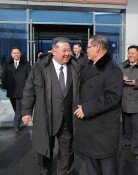Priority Purchase Policies for Public Institutions Vary by Ministry
Priority Purchase Policies for Public Institutions Vary by Ministry
Posted June. 17, 2004 21:36,
--Multiple Priority Purchase Policies
The Ministry of Environment is promoting a policy to extend the current Priority Purchase Policy of Goods with the Environment-friendly Mark to the Compulsory Purchase Policy of Environment-friendly Goods. The ministry is establishing laws regarding purchase encouragement for environment-friendly goods that use purchase history of environment-friendly goods as public institutions evaluation data. If the policy should go into effect, it is an actual obligation to purchase environment-friendly goods.
The Ministry of Health and Welfare is also promoting a policy to extend the existing policy of giving priority to goods produced by people with disabilities starting this September.
The Ministry of Commerce, Industry, and Energy announced on June 15 that they will implement the policy in which public institutions are required to purchase more than 20 percent of goods that obtained new technology certification among their whole purchases starting in the latter half of the year. They also plan to expand their policy for public institutions to prioritize purchases of goods with the reliability mark or R mark..
In addition, the Korean Women Entrepreneurs Association has submitted a proposal to the government to give a priority in purchasing goods from companies that are led by women entrepreneurs.
--Reckless Act
With each ministry announcing their own policies, they are not holding cooperative discussions between ministries. There are even government workers who are not aware whether there are priority purchase systems implemented by other ministries.
An official at the Health and Welfare Ministry questioned back, asking whether there is a priority purchase system promoted by the Ministry of Environment in response to the question: what they would do if their list of priority purchase items overlaps with the ones on the policy promoted by the Ministry of Environment?
If the priority purchase items overlap, it is obvious that public institutions will be confused about what to buy between them. In addition, if all five policies mentioned currently are put into effect, there is a concern that public institutions will almost definitely lose the right of choice on certain products.
A procurement official at a public institution said, We are only confused if the different ministries impose different priority purchase policies without the government giving the priority among them, adding, The institutions at the front will suffer over the problem of which ministry they should comply with.
Another procurement official at a government-invested institution asked: I do not know what they are asking me to buy. Is it that I have to buy goods that are made by women with disabilities and with environment-friendly technologies and new technology certification?
A few ministries are showing signs of confliction over the policy. A related official at the Ministry of Commerce, Industry, and Energy said, The priority purchase of new technology certification goods was ordered by the president, and insisted, Even if it overlaps with other policies, the new technology goods should come first. On the other hand, an environment ministry official insisted: Purchasing environment-friendly goods is a must, so our policy comes first.
Kim Jong-hwa, legislative officer at the National Assemblys Legislation Office, pointed out: There should be an ample amount of discussion when priority goods are overlapping.
Wan-Bae Lee roryrery@donga.com




![[단독]임성근, 4차례 음주운전 적발…99년 집행유예 기간 중 무면허 음주 적발](https://dimg.donga.com/c/138/175/90/1/wps/NEWS/IMAGE/2026/01/20/133195400.1.png)


